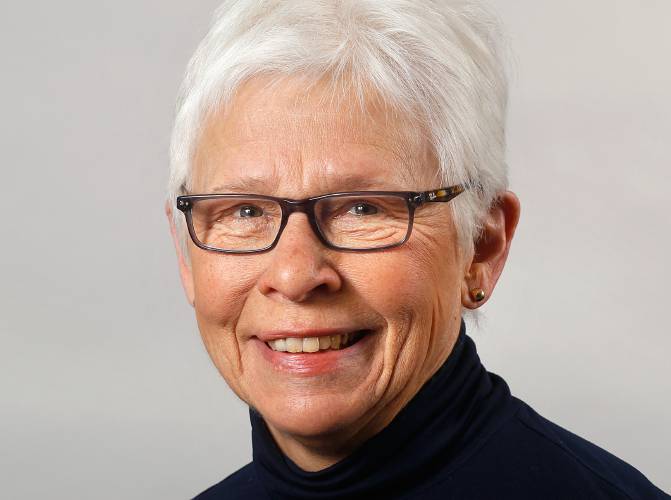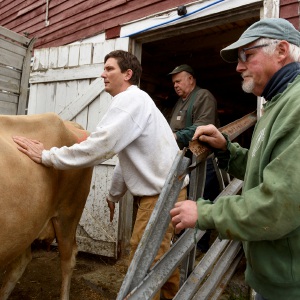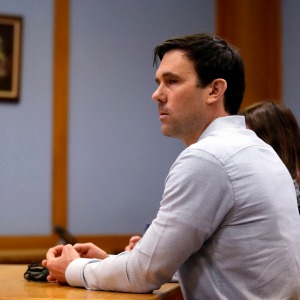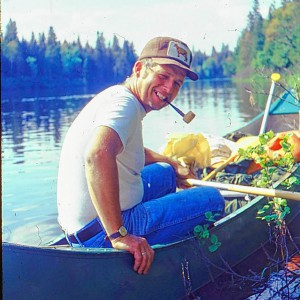Column: The burning world and cares close to home

Mary Otto. Copyright (c) Valley News. May not be reprinted or used online without permission. Send requests to permission@vnews.com.
| Published: 03-15-2024 5:26 PM |
Chugging up the sunny hillside toward home after our usual morning walk in the woods, my husband and I entered our warm cottage. It felt good on a 13-degree Vermont day, in contrast to the previous day’s 55 degrees We hung up our heavy coats and moved toward the kitchen. I ground the coffee beans and reached for the pottery bowl that would contain my oatmeal and blueberries. Anticipating the hours ahead, I looked forward to reading, writing, planning, connecting with friends and family.
My husband, though, had bent down to pick up the New York Times tossed in front of our door and had opened it up on the large granite counter. As I waited for my coffee to brew and my oatmeal to cook magically in the microwave, I glanced at the headlines and op-ed previews: “Will Starvation Come for Gaza’s Children?” “Covid Funds Shrinking, Paid Family Caregivers Face Big Cutbacks,” “Ukraine’s Deepening Fog of War,” “Atrocities Mount in Sudan as War Spirals.”
These and other stories of deprivation, devastation, hatred, and fear stand in stark contrast to my activities and plans, at least for this moment in time. The breakfast, the comfortable kitchen, the winter day in Vermont, the life I live as a retiree. Perhaps, like many of us, I have somehow accepted all this as earned, after the years of studying, caring for children, investing in a rewarding career and volunteering in places I felt I could make a difference.
The people in the newspaper stories aren’t brewing coffee from freshly ground beans. They aren’t arising morning after blessed morning to walk in the woods and return to make hot oatmeal. No. Nothing like this. They, their families, their institutions, their traditions, their ways of life, even their homelands are under siege. The civilized world, I heard a news commentator say recently, is a thin veneer.
The life of a dear friend, Hobby, is also fragile, as she lives with an incurable cancer. In spite of our knowing that aging and dying are the way of the world, for each of us these losses too can be devastating.
I have recently begun reading “Embrace Fearlessly the Burning World,” a collection of essays by the late Barry Lopez. In an early piece Lopez declares, “An Era of Emergencies is bearing down on us and we cannot look away.” He continues, “We’ve lived for generations in America with our promising tomorrows waiting for us….. We believe in the eventual triumph of liberal values…”. And he concludes starkly, “I see no sign of such a salvation on the horizon.”
Whether the fires are distant and able to be compartmentalized into moments of reading the paper or are very close at hand, they all demand our attention. They ask us to notice, to see. But then what?
Indeed, we feel sadness, compassion, anger. But with many of the tumultuous stories in the news playing out on the other side of the earth, we are powerless to intervene. Of course we can donate money. And yes, through the ballot box we might have a voice in US actions in these situations. Still, our agency is limited.
Article continues after...
Yesterday's Most Read Articles
 Herd departs Hartford’s last remaining dairy farm
Herd departs Hartford’s last remaining dairy farm
 Kenyon: What makes Dartmouth different?
Kenyon: What makes Dartmouth different?
 At Dartmouth, hundreds protest ongoing war in Gaza and express support for academic freedom
At Dartmouth, hundreds protest ongoing war in Gaza and express support for academic freedom
 Editorial: Parker parole a reminder of how violence reshapes our lives
Editorial: Parker parole a reminder of how violence reshapes our lives
 A Life: Richard Fabrizio ‘was not getting rich but was doing something that made him happy’
A Life: Richard Fabrizio ‘was not getting rich but was doing something that made him happy’
Would it be paradoxical to say that a more realistic way to embrace the burning world might be a personal one? Could we consider that by recognizing the parallels between the enormous disturbances in the distance and the individual trials and heartaches closer by, we might respond with energy and empathy to circumstances where our actions would be of tangible value?
In recent weeks, I have returned to reading poetry, pulling books from my shelf and remembering with delight some of my favorites. Why? To offer occasional selections to my friend Hobby, as her cancer advances. She and I have a long history together. Feeling separated from her now, I wanted to connect, and poetry offered a link.
Mary Oliver is always at hand. Her imagery is vivid, her pace lively, her understanding both deep and comforting. As I read Oliver, I feel held. I believe Hobby does too, from her husband’s reports.
The early 20th century Quaker Rufus Jones has long been a reference point for me. Even as I acknowledge a sense of responsibility and concern for the people and events of faraway places, it is the bonds with those who are closer that matter most. “I pin my hopes,” Jones says, “to quiet processes and small circles in which vital and transforming events take place.”
I pin my hopes there too.
Mary K. Otto, formerly of Norwich, lives in Shelburne, Vt. Readers may email her at maryotto13@gmail.com.

 Editorial: Chris Sununu’s moral vacuum
Editorial: Chris Sununu’s moral vacuum Editorial: Gambling tarnishes America’s sporting life
Editorial: Gambling tarnishes America’s sporting life By the Way: A white nationalist’s many mistruths
By the Way: A white nationalist’s many mistruths
